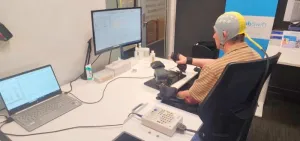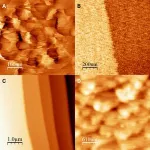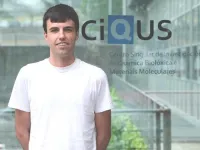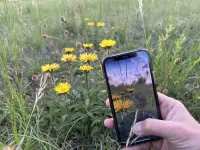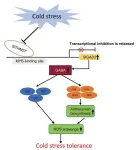(Press-News.org) A personalized brain-computer interface therapy, RehabSwift, significantly enhances hand mobility for stroke survivors. Strokes often lead to impaired hand function, presenting substantial challenges in daily activities. Sam Darvishi and colleagues developed and tested a brain-computer interface therapy that translates imagined hand movements into real actions using a personalized algorithm and bionic hands. The study involved twelve chronic stroke survivors from South Australia who had limited use of their arms but retained clear thinking abilities. Throughout 18 sessions, participants used the RehabSwift system, which included a special cap that measured their brain activity. Participants imagined moving their fingers, and this brain activity was then translated into actual finger movements by bionic hands providing both visual and physical feedback. Participants showed improvements in various areas, including overall arm function, hand movement tests, reaction times, and hand strength. These gains were maintained at follow-up assessments 4 ̶ 6 weeks after training. Many participants reported achieving their mobility goals after the training. According to the authors, these findings highlight the potential of brain-computer interfaces as powerful, personalized, and adaptable tools for stroke rehabilitation.
END
Brain-computer interface therapy for stroke survivors
2024-07-09
ELSE PRESS RELEASES FROM THIS DATE:
SynGAP Research Fund (SRF) increases support for SYNGAP1 organoid research at the University of Southern California’s Quadrato Lab
2024-07-09
MILL VALLEY, Calif. – July 9, 2024 – SynGAP Research Fund (SRF), a 501(c)(3) public charity whose mission is to improve the quality of life for patients suffering from SYNGAP1-Related Disorders (SRD) through the research and development of treatments, therapies, and support systems, has awarded a $130,000 grant to the University of Southern California’s Quadrato Lab to inspect and stratify the effects of specific SYNGAP1 variants on their patient-derived neuronal model system, furthering the world’s understanding ...
Study finds 1 in 12 patients labeled as having ‘benign’ results actually had high-risk prostate cancer
2024-07-09
New research highlights the challenge of balancing the risks of overdiagnosing and underdiagnosing prostate cancer early enough to intervene and minimize risk of death. Recently, some experts have called for the lowest grade of prostate cancer—biopsy Gleason Grade Group (GGG) 1—to be reclassified as ‘benign.’ But a new study led by a researcher from Mass General Brigham has found that many patients with a biopsy GGG1 may have a more aggressive cancer than their biopsy alone suggests.
By looking at data from more than 10,000 patients at a university in Germany, researchers found that at least 8 percent of patients with this ...
Marcos Vilela wins Lilly Research Award for Doctoral Students
2024-07-09
The Royal Spanish Society of Chemistry (RSEQ) and Lilly have announced the winning theses of the 22nd Research Awards for Doctoral Students, which acknowledge outstanding work in the fields of Organic, Pharmaceutical, and Analytical Chemistry. Marcos Vilela, currently pursuing his PhD at the Center for Research in Biological Chemistry and Molecular Materials (CiQUS) at the University of Santiago de Compostela (USC), was awarded alongside Andrea Palone from the University of Girona (UdG) and the University of Rome "Tor Vergata," and Beatriz Arévalo from the Complutense University of Madrid (UCM).
Marcos' thesis, supervised by CiQUS Principal ...
Trust, more than knowledge, critical for acceptance of fully autonomous vehicles
2024-07-09
PULLMAN, Wash. – While not yet on the market, fully autonomous vehicles are promoted as a way to make road travel dramatically safer, but a recent study found that knowing more about them did not improve people’s perception of their risk. They needed to have more trust in them too.
This study adds to the evidence from other research that knowledge alone is not enough to sway people’s attitudes toward complex technology and science, such as gene editing or climate change. In this case, Washington State University researchers found that trust in the autonomous vehicles’ reliability and performance played the strongest role in improving ...
Run screaming or slow retreat? New study advances understanding of brain responses to emotionally-charged scenes
2024-07-09
The ability to recognise and respond to emotionally-charged situations is essential to a species’ evolutionary success. A new study published today [July 9th] in Nature Communications advances our understanding of how the brain responds to emotionally charged objects and scenes.
The research, led by Trinity College Dublin neuroscientist Prof. Sonia Bishop and Google researcher Samy Abdel-Ghaffar while he was a PhD student in Prof. Bishop's lab at UC Berkeley, has identified how the brain represents different categories of emotional stimuli in a way that allows for ...
Brain neurotransmitter receptor antagonist found to prevent opioid addiction in mice
2024-07-09
New research led by UCLA Health has found a drug that treats insomnia works to prevent the addictive effects of the morphine opioids in mice while still providing effective pain relief.
The study, published in the journal Nature Mental Health, concluded that suvorexant, which blocks brain receptors for a neurotransmitter called hypocretin, prevents opioid addiction. At high doses in humans, suvorexant induces sleep and is used to treat insomnia. But sleep was not induced, and behavioral alertness was maintained, at the much lower doses effective in preventing ...
Nerve damage from breast cancer treatment can be predicted
2024-07-09
Many women treated for breast cancer using taxanes, a type of cytostatic drug, often experience side effects in the nervous system. Researchers at Linköping University have developed a tool that can predict the risk level for each individual. The tool could help doctors adapt treatment to avoid persistent side effects in those at the greatest risk.
More and more people are becoming cancer survivors. But even if they have survived the disease, an increasing number still suffer from the side effects of cancer treatment. In a recent study from Linköping University, researchers studied the side effects of taxanes, ...
Water stored under artificial turf could make cities cooler and safer to play in
2024-07-09
For those living in cities, space to play sports outside can be a scarcity. Recently, natural grass in parks or public sports courts has often been replaced with more durable artificial turf to allow heavy consecutive use.
There are, however, downsides to this practice, both for people and for cities as a whole. Now, scientists in the Netherlands have set out to change that by integrating a subsurface water storage and capillary irrigation system under artificial turf sports fields.
“Here we show that including a subsurface water storage and capillary ...
How a plant app helps identify the consequences of climate change
2024-07-09
Plants are known to respond to seasonal changes by budding, leafing, and flowering. As climate change stands to shift these so-called phenological stages in the life cycle of plants, access to data about phenological changes – from many different locations and in different plants – can be used to draw conclusions about the actual effects of climate change. However, conducting such analyses require a large amount of data and data collection of this scale would be unthinkable without the help of citizen scientists. “The problem is that the quality of the data suffers when fewer people engage ...
Tomato triumph: genetic key to chill-proof crops unveiled
2024-07-09
In a significant advancement for agricultural biotechnology, researchers have identified a genetic mechanism that enhances the cold tolerance of tomatoes. This breakthrough is pivotal for cultivating crops in cooler climates, ensuring stable yields and bolstering global food security. The study focuses on the SlGAD2 gene, which, when overexpressed, elevates the plant's γ-aminobutyric acid (GABA) levels, boosts antioxidant activities, and stimulates anthocyanin production, collectively improving cold resilience.
Tomatoes play a vital role in global agriculture but are susceptible ...
